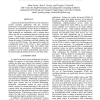Free Online Productivity Tools
i2Speak
i2Symbol
i2OCR
iTex2Img
iWeb2Print
iWeb2Shot
i2Type
iPdf2Split
iPdf2Merge
i2Bopomofo
i2Arabic
i2Style
i2Image
i2PDF
iLatex2Rtf
Sci2ools
FPL
2009
Springer
2009
Springer
Reconfigurable fault tolerance: A framework for environmentally adaptive fault mitigation in space
Commercial SRAM-based FPGAs have the potential to provide aerospace applications with the necessary performance to meet next-generation mission requirements. However, the susceptibility of these devices to radiation in the form of single-event upsets is a significant drawback. TMR techniques are traditionally used to mitigate these effects, but with an overwhelming amount of extra area and power. We propose a framework for reconfigurable fault tolerance which enables systems engineers to dynamically change the amount of redundancy and fault mitigation that is used in an FPGA design. This approach leverages the reconfigurable nature of the FPGA to allow significant processing to be performed safely and reliably when environmental factors permit. Phased-mission Markov modeling is used to estimate performability gains that can be achieved using the framework for two case-study orbits.
Commercial SRAM-based FPGAs | FPL 2009 | Hardware | Reconfigurable Fault Tolerance | Significant Drawback |
| Added | 24 Jul 2010 |
| Updated | 24 Jul 2010 |
| Type | Conference |
| Year | 2009 |
| Where | FPL |
| Authors | Adam Jacobs, Alan D. George, Grzegorz Cieslewski |
Comments (0)

